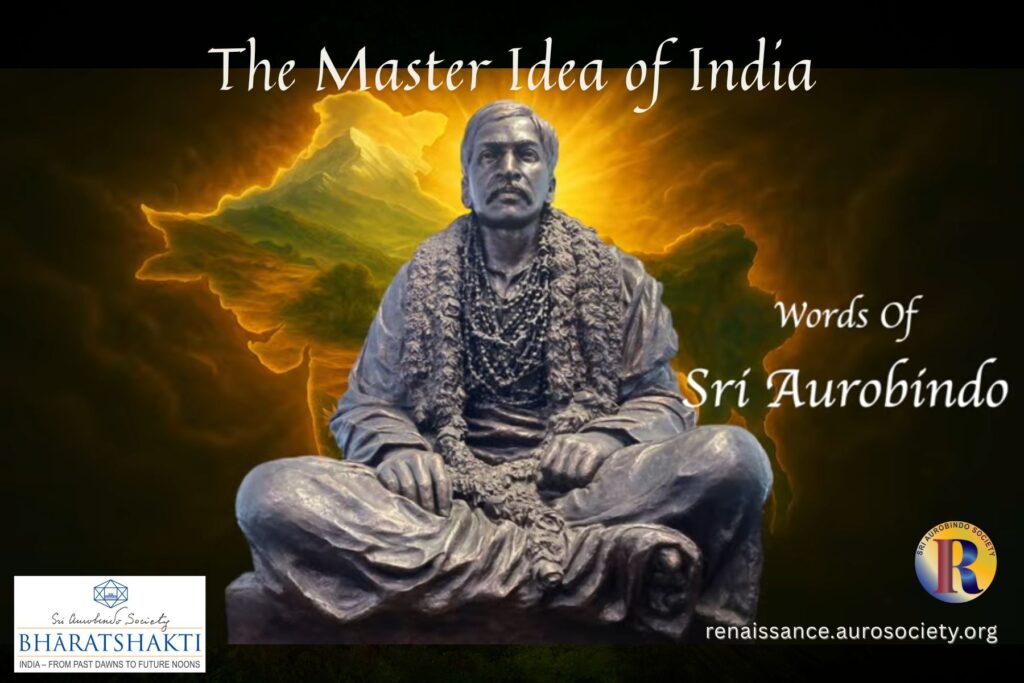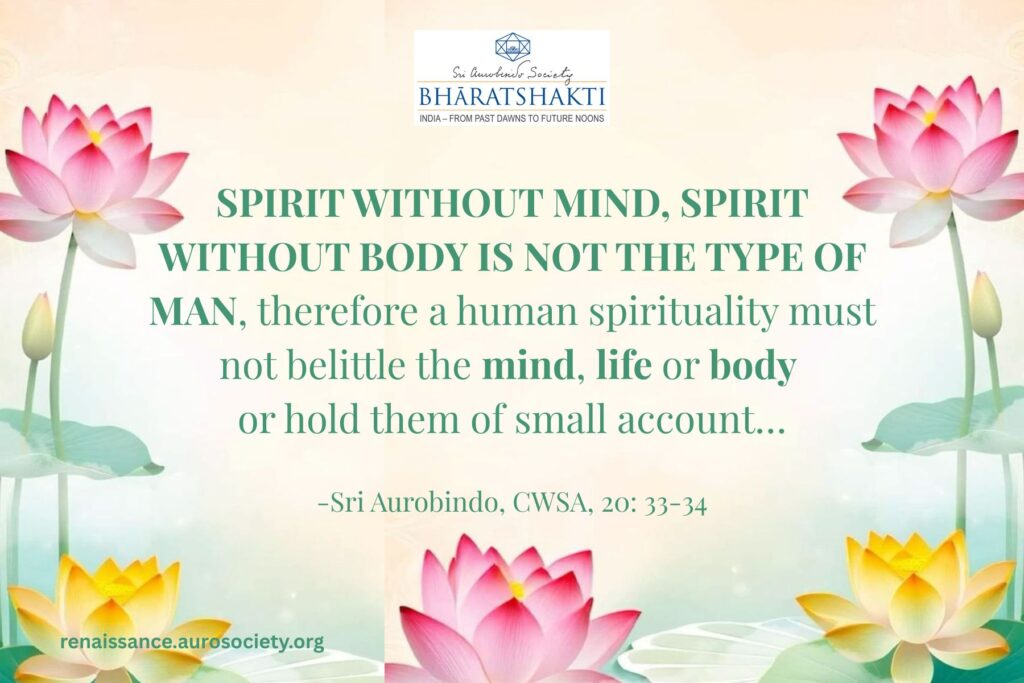Volume 1, Issue 8
Author: Agali Venkappa Sastri

Continued from Part 12
SPIRITUAL NATIONALISM
A clear conception of spirituality and its application to national life in all its aspects is the single test of the world-value of Indian nationalism.
Spirituality is not a high intellectuality, not idealism, not an ethical turn of mind or moral purity and austerity, not religiosity or an ardent and exalted emotional fervour, not even a compound of all these excellent things; a mental belief, creed or faith, an emotional aspiration, a regulation of conduct according to a religious or ethical formula are not spiritual achievement and experience.
~ CWSA, Vol. 22, pp. 889-890
These things are of considerable value to mind and life; they are of value to the spiritual evolution itself as preparatory movements disciplining, purifying or giving a suitable form to the nature; but they still belong to the mental evolution, — the beginning of a spiritual realisation, experience, change is not yet there.
Spirituality is in its essence an awakening to the inner reality of our being, to a spirit, self, soul which is other than our mind, life and body, an inner aspiration to know, to feel, to be that, to enter into contact with the greater Reality beyond and pervading the universe which inhabits also our own being, to be in communion with It and union with It, and a turning, a conversion, a transformation of our whole being as a result of the aspiration, the contact, the union, a growth or waking into a new becoming or new being, a new self, a new nature.
First Turn to the Spiritual
The first turn to the spiritual, the first movement will begin only when the individual is able to resist the glamorous outward life, when the individual is drawn within. It begins when one transfers the centre from the vital and physical in which one is immersed by a thousand bonds to the subjective and there arrives at the deepest truth of oneself.
It is not a turn to the world of mind, not to an ethical idealism or aesthetic gratification, but to the world of the spirit which is the source of all these experiences and can alone provide the right rule of living, the right law of enjoyment.
The spirit, once found, it will be realised, is not only static but dynamic as well, though it is possible to seek a beatitude of Nirvana and abide in the Transcendent. The spirit is capable not only of working on all these lower members, on every one of these instruments of mind, life and body but also of converting them to its law. In other words, the spirit is capable of transforming them to a higher knowledge, higher power, a higher delight.
As long as we are centred in the outer vital and the physical, it is natural that they should seem more real, more tangible than the inner subjective being which, just because it is insufficiently developed, not properly seized in the consciousness, seems comparatively feeble and ineffectual, but the subjective, the inner is ever the origin of the outer.
The outer has a value only in so far as it is expressive of the inner status.
~ ibid, p. 1055
The spirit must not be reduced to the inferior formulations of the mind, rather the mind must know itself as the power, the instrument of the spirit. The spirit must not be reduced to the terms of life, rather life must find its force in the spirit and operate as a channel of the supreme energy.
The body too must not attempt to reduce the spirit to its gross level but seize the intuition of its inherent divinity, not simply aim at increased material functioning but undergo a spiritual transformation. The moment this Spirit-sense as the Real, the Sole-Existent dawns, our normal view of things will be transfigured.
Decisive Turn toward the Spirit
We must arrive at a decisive crisis of transformation, not simply be content with a modicum of spirituality or a little leavening or modification of our normal life with the spiritual motive. So far man’s achievement has been partial or maimed. If he aimed high at the true, the good, the beautiful, he either chose to let alone the vital and the physical or effected a compromise with the lower nature; the higher and the lower existed side by side, the higher no doubt controlling the lower but not setting its total stamp upon it.
At the first chance, life will assert its claim or if forcefully held down, suffer an atrophy, a loss of vitality, a decay of itself causing a decay of the whole society.
In the age typified by German vitalistic philosophy, the higher powers of the mind and intelligence catered for the vital and physical impulses instead of subjugating them to a higher law. The suffering that inevitably accompanied unbridled vital indulgence has meant a transferring of the centre to the mental and with its aid a better ordering of individual, of national and international life.
This is roughly the road traversed by Bhrigu in the Upanishads, first beginning with the material, then passing on to the vital and again to the mind. But not until the last ascension of the spiritual is made will man know either rest or satisfaction.
The spiritual self must conquer man, the manu, commandeer the forces of the mind not in its characteristic modes but spiritualised, and likewise the clamorous vital and the inert physical.
There has been long in preparation a third stage which belongs to the future. Its inspiring idea has been often cast out in limited or large, veiled and quiet or bold and striking spiritual movements and potent new disciplines and religions, but it has not yet been successful in finding its way or imposing new lines on human life. The circumstances were adverse, the hour not yet come.
This greatest movement of the Indian spiritual mind has a double impulse. Its will is to call the community of men and all men each according to his power to live in the greatest light of all and found their whole life on some fully revealed power and grand uplifting truth of the Spirit.
But it has had too at times a highest vision which sees the possibility not only of an ascent towards the Eternal but of a descent of the Divine Consciousness and a change of human into divine nature. A perception of the divinity hidden in man has been its crowning force.
“This is a turn that cannot be rightly understood in the ideas or language of the European religious reformer or his imitators. It is not what the purist of the reason or the purist of the spirit imagines it to be and by that too hasty imagination falls short in his endeavour.
Its index vision is pointed to a truth that exceeds the human mind and, if at all realised in his members, would turn human life into a divine superlife. And not until this third largest sweep of the spiritual evolution has come into its own, can Indian civilisation be said to have discharged its mission, to have spoken its last word and be functus officio, crowned and complete in its office of mediation between the life of man and the spirit.
~ CWSA, Vol. 20, pp. 215-216



